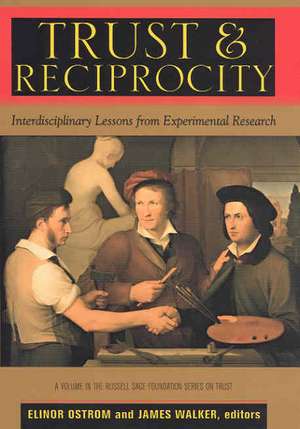Trust and Reciprocity: Interdisciplinary Lessons for Experimental Research: Russell Sage Foundation Series on Trust
Editat de Elinor Ostrom, James Walkeren Limba Engleză Paperback – 9 iun 2005
Trust is essential to economic and social transactions of all kinds, from choosing a marriage partner, to taking a job, and even buying a used car. The benefits to be gained from such transactions originate in the willingness of individuals to take risks by placing trust in others to behave in cooperative and non-exploitative ways. But how do humans decide whether or not to trust someone? Using findings from evolutionary psychology, game theory, and laboratory experiments, Trust and Reciprocity examines the importance of reciprocal relationships in explaining the origins of trust and trustworthy behavior. In Part I, contributor Russell Hardin argues that before one can understand trust one must account for the conditions that make someone trustworthy. Elinor Ostrom discusses evidence that individuals achieve outcomes better than those predicted by models of game theory based on purely selfish motivations. In Part II, the book takes on the biological foundations of trust. Frans de Waal illustrates the deep evolutionary roots of trust and reciprocity with examples from the animal world, such as the way chimpanzees exchange social services like grooming and sharing. Other contributors look at the links between evolution, cognition, and behavior. Kevin McCabe examines how the human mind processes the complex commitments that reciprocal relationships require, summarizing brain imaging experiments that suggest the frontal lobe region is activated when humans try to cooperate with their fellow humans. Acknowledging the importance of game theory as a theoretical model for examining strategic relationships, in Part III the contributors tackle the question of how simple game theoretic models must be extended to explain behavior in situations involving trust and reciprocity. Reviewing a range of experimental studies, Karen Cook and Robin Cooper conclude that trust is dependent on the complex relationships between incentives and individual characteristics, and must be examined in light of the social contexts which promote or erode trust. As an example, Catherine Eckel and Rick Wilson explore how people's cues, such as facial expressions and body language, affect whether others will trust them. The divergent views in this volume are unified by the basic conviction that humans gain through the development of trusting relationships. Trust and Reciprocity advances our understanding of what makes people willing or unwilling to take the risks involved in building such relationships and why. A Volume in the Russell Sage Foundation Series on Trust
Preț: 256.17 lei
Nou
Puncte Express: 384
Preț estimativ în valută:
49.03€ • 50.99$ • 41.03£
49.03€ • 50.99$ • 41.03£
Carte indisponibilă temporar
Doresc să fiu notificat când acest titlu va fi disponibil:
Se trimite...
Preluare comenzi: 021 569.72.76
Specificații
ISBN-13: 9780871546487
ISBN-10: 0871546485
Pagini: 423
Dimensiuni: 152 x 229 x 23 mm
Greutate: 0.57 kg
Editura: Russell Sage Foundation
Colecția Russell Sage Foundation
Seria Russell Sage Foundation Series on Trust
ISBN-10: 0871546485
Pagini: 423
Dimensiuni: 152 x 229 x 23 mm
Greutate: 0.57 kg
Editura: Russell Sage Foundation
Colecția Russell Sage Foundation
Seria Russell Sage Foundation Series on Trust
Notă biografică
ELINOR OSTROM is Arthur F. Bentley Professor of Political Science and codirector of the Workshop in Political Theory and Policy Analysis and the Center for the Study of Institutions, Population, and Environmental Change, Indiana University, Bloomington. JAMES WALKER is Professor of Economics and co-associate director of the Workshop in Political Theory and Policy Analysis, Indiana University, Bloomington.
Cuprins
PART I INTRODUCTION: SOCIAL DILEMMAS AND TRUST 1 Chapter 1 Introduction 3 Elinor Ostrom and James Walker Chapter 2 Toward a Behavioral Theory Linking Trust, Reciprocity, and Reputation 19 Elinor Ostrom Chapter 3 Gaming Trust 80 Russell Hardin PART II BIOLOGICAL FOUNDATIONS OF TRUST AND RECIPROCITY 103 Chapter 4 Biological Foundations of Reciprocity 105 Robert Kurzban Chapter 5 The Chimpanzee's Service Economy: Evidence for Cognition-Based Reciprocal Exchange 128 Frans B. M. de Waal PART III THE LINKS BETWEEN EVOLUTION, COGNITION, AND BEHAVIOR 145 Chapter 6 A Cognitive Theory of Reciprocal Exchange 147 Kevin A. McCabe Chapter 7 -Conflict, Interpersonal Assessment, and the Evolution of Cooperation: Simulation Results 170 James Hanley, John Orbell, and Tomonori Morikawa PART IV EXPERIMENTAL EVIDENCE 207 Chapter 8 Experimental Studies of Cooperation, Trust, and Social Exchange 209 Karen S. Cook and Robin M. Cooper Chapter 9 The Human Face of Game Theory: Trust and Reciprocity in Sequential Games 245 Catherine C. Eckel and Rick K. Wilson Chapter 10 Strategic Analysis in Games: What Information Do Players Use? 275 Kevin A. McCabe and Vernon L. Smith Chapter 11 Trust in Children 302 William T. Harbaugh, Kate Krause, Steven G. Liday Jr., and Lise Vesterlund Chapter 12 Trust in Two-Person Games: Game Structures and Linkages 323 T. K. Ahn, Elinor Ostrom, David Schmidt, and James Walker Chapter 13 Cross-Societal Experimentation on Trust: A Comparison of the United States and Japan 352 Toshio Yamagishi PART V CONCLUSIONS 371 Chapter 14 The Transformation of a Skeptic: What Nonexperimentalists Can Learn from Experimentalists 373 Margaret Levi Chapter 15 Conclusion 381 James Walker and Elinor Ostrom Glossary 389 Index 395













